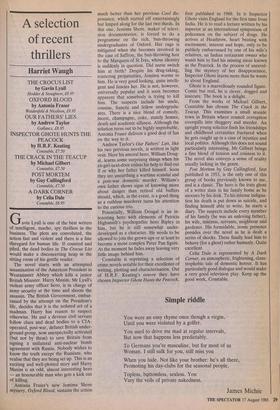A selection of recent thrillers
Harriet Waugh
THE CROCUS LIST by Gavin Lyall
Hodder & Stoughton, £8.95
OXFORD BLOOD by Antonia Fraser
Weidenfeld & Nicolson, £9.95
OUR FATHERS' LIES by Andrew Taylor
Gollancz, £8.95
INSPECTOR GHOTE HUNTS THE PEACOCK by H.R.F. Keating
Constable, £7.50
THE CRACK IN THE TEACUP by Michael Gilbert
Constable, £7.50
POST MORTEM by Guy Cullingford
Constable, £7.50
A DARK CORNER by Celia Dale
Constable, £6.95
Gavin Lyall is one of the best writers of intelligent, macho, spy thrillers in the business. The plots are convoluted, the action fast and violent and there is a fine disregard for human life. If counted and piled, the dead bodies in The Crocus List would make a disconcerting heap in the sitting room of his gentle reader.
The novel starts with an attempted assassination of the American President in Westminster Abbey which kills a junior British Minister. Harry Maxim, Mr Lyall's violent army officer hero, is in charge of army security at the time and shoots the assassin. The British Government, embar- rassed by the attempt on the President's life, decides that it is the isolated act of a madman. Harry has reason to suspect otherwise. He and a devious civil servant follow clues and dead bodies to a CIA- operated, post-war, defunct British under- ground group, now unexpectedly activated (but not by them) to save Britain from signing a unilateral anti-nuclear bomb agreement with Russia. Nobody wishes to know the truth except the Russians, who realise that they are being set up. This is an exciting and well-plotted story and Harry Maxim is an odd, almost interesting hero — an honourable man who gets a kick out of killing.
Antonia Fraser's new Jemima Shore mystery, Oxford Blood, sustains the action much better than her previous Cool Re- pentance, which started off entertainingly but limped along for the last two thirds. In this one, Jemima Shore, maker of televi- sion documentaries, is forced to do a programme on the rich, bun-throwing undergraduates of Oxford. Her rage is mitigated when she becomes involved in the case of Saffron, the bun-throwing heir to the Marquess of St Ives, whose identity is suddenly in question. Did nurse switch him at birth? Despite his drug-taking, roistering propensities, Jemima warms to him. He is very good looking, quite intelli- gent and fancies her. He is not, however, universally popular and it soon becomes apparent that somebody is trying to kill him. The suspects include his uncle, cousins, fiancée and fellow undergradu- ates. There is a nice blend of comedy, incest, champagne, coke, stately homes, death and academic silliness. Although the solution turns out to be highly improbable, Antonia Fraser delivers a good deal of fun on the way to it. Andrew Taylor's Our Fathers' Lies, like his two previous novels, is written in light vein. Here his amoral hero, William Doug- al, learns some surprising things when his ex-girl-next-door enlists his help to find out if or why her father killed himself. Soon they are unearthing a wartime scandal and a post-war domestic murder. William's own father shows signs of knowing more about danger than retired old buffers should, which, in the event, is a good thing as a ruthless murderer turns his attention to the curious trio.
Potentially, William Dougal is an in- teresting hero with elements of Patricia Highsmith's psychopathic hero Ripley in him, but he is still somewhat under- developed as a character. He needs to be allowed to join the grown-ups or at least to become a more complex Peter Pan figure. At the moment he fades away leaving very little image behind him.
Constable is reprinting a selection of crime novels notable for their excellence of writing, plotting and characterisation. Out of H.R.F. Keating's oeuvre they have chosen Inspector Ghote Hunts the Peacock,
first published in 1968. In it Inspector Ghote visits England for the first time from India. He is to read a lecture written by his superior at an international symposium of policemen on the subject of drugs. He arrives at Heathrow, heart beating with excitement, interest and hope, only to be publicly embarrassed by one of his wife's relatives, an Indian restaurant owner who wants him to find his missing niece known as the Peacock. In the process of unravel- ling the mystery of her disappearance, Inspector Ghote learns more than he wants to about England.
Ghote is a marvellously rounded figure. Comic but real, he is clever, dogged and insecure. The book is a delight.
From the works of Michael Gilbert, Constable has chosen The Crack in the Teacup. This examines a small seaside
town in Britain where council corruption overspills into thuggery and murder. An upright young solicitor finds his friendships and childhood certainties fractured when he gets caught up in a case of injustice and local politics. Although this does not sound particularly interesting, Mr Gilbert brings a fine blend of tension and cosiness to it. The novel also conveys a sense of reality usually lacking in the genre.
Post Mortem by Guy Cullingford, first published in 1953, is the only one of this
group of books previously known to me, and is a classic. The hero is the irate ghost of a writer slain in his family home as he snoozes by his desk. To his intense indigna- tion his death is put down as suicide, and finding himself able to write, he starts a diary. The suspects include every member of his family (he was an unloving father), his wife, mistress, servants, neighbour and gardener. His formidable, ironic presence presides over the novel as he is dealt a series of shocks. These finally lead him to behave (for a ghost) rather humanly. Quite excellent.
Celia Dale is represented by A Dark Corner, an atmospheric, frightening, claus- trophobic tale of domestic horror. It has particularly good dialogue and would make a very good television play. Keep up the good work, Constable.














































 Previous page
Previous page